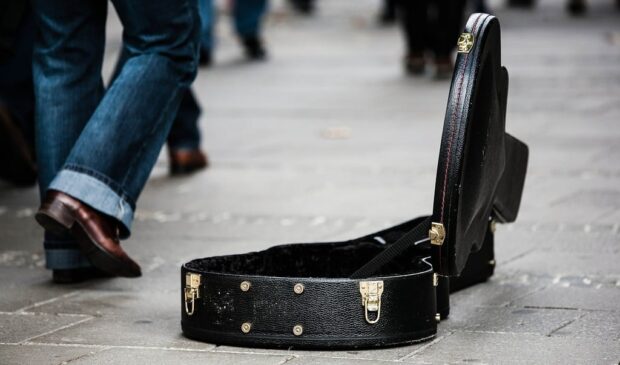Music Commission considers how city could better promote local musicians
Friday, June 7, 2024 by
Chad Swiatecki The Music Commission will likely ask the city to explore a mechanism to better promote performances by local artists, possibly using excess Hotel Occupancy Tax funds or money allocated from the city’s General Fund.
At Monday’s meeting, the commission heard a presentation from Commissioner Scott Strickland and musician Chris Hawkes that focused on possible uses for more than $400,000 in hotel tax funds available for music uses that weren’t directed toward the Live Music Fund or any other related programs.
The suggested outline of the Local Music Awareness Initiative would include ongoing promotional efforts with local radio stations that play Austin artists as well as signage and an effort to inform local hotels about concerts featuring local musicians. Another possible form would be awarding microgrants to musicians or possibly venues to promote specific shows with Austin artists.
“I see this as something that would kind of be an easy ask for commercial media, to buy a short ad space where you talk about something that’s already going on,” Hawkes said. “You reserve it for stations that already play local music, which also kind of adds a level of encouragement for them to continue to do so.”
Commissioners generally supported the concept of increasing the city’s role in promoting local artists, but there was concern over how any microgrants would be administered since the Economic Development Department already has to use third-party vendors to handle some existing programs. In its recently approved round of requests for the next city budget, the commission included a $400,000 ask to improve promotion for local artists.
Commissioner Celeste Quesada said any promotional program should be designed to use and build upon existing commercial and public media, including radio stations, digital platforms and print publications.
“My recommendation would be that we see what is out there and kind of do some critiquing of what’s out there already, and then see how we can really improve upon that,” she said. “I like what we’re talking about here very much … but I think that it’s really important to really dig in and and critique what we have and not just throw something else on top.”
Erica Shamaly, head of the Music and Entertainment Division, said the city already spends $100,000 annually with Visit Austin to promote local music to outside visitors, while also offering training to recipients of Live Music Fund grants to help optimize their promotion and career marketing efforts. She said further promotional efforts led by the city would have to be carefully designed to not give the appearance of playing favorites for specific artists or compete with existing marketing channels.
“Our job is to help with that professional development of our local artists to do a better job of marketing themselves and then we give them the funds through the Live Music Fund to be able to do that,” she said. “Also as the city, we don’t want to necessarily compete with our radio stations and other community organizations that are already doing a great job of promoting music.”
Strickland, who is a working musician, said the commission has already successfully provided a framework for the Live Music Fund that is considered successful, which proves that the group can find a way to make a new promotional program with similar results.
“The only way that local artists are going to continue to grow and not be eclipsed by the (touring) artists that are making the managers and the promoters and the booking agencies and all these other people all this money is for these artists to become economically viable. The local artists to become economically viable,” he said. “The only way that’s going to happen is if they have the dollars to advertise themselves to make sure that people are going to their shows.”
The Austin Monitor’s work is made possible by donations from the community. Though our reporting covers donors from time to time, we are careful to keep business and editorial efforts separate while maintaining transparency. A complete list of donors is available here, and our code of ethics is explained here.
You're a community leader
And we’re honored you look to us for serious, in-depth news. You know a strong community needs local and dedicated watchdog reporting. We’re here for you and that won’t change. Now will you take the powerful next step and support our nonprofit news organization?







